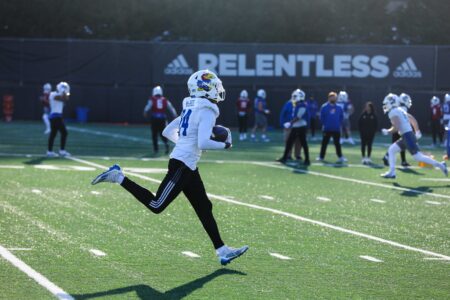Mangino at center of drive to silence obscene chant at KU football games
Kansas University football coach Mark Mangino will ask football fans this week to stop yelling an obscene chant after kickoffs.
Mangino will make the remarks in a video that will be e-mailed to students and displayed on the video board before Saturday’s football game against the University of Colorado, said Jim Marchiony, an athletics department spokesman.
In the message, Mangino will ask the thousands of students who yell “Rip his (expletive) head off” after kickoffs to find something else to say.
“Students were on board with Coach and the players before anybody. He’ll recognize that and thank them for their support,” Marchiony said. “He’s going to suggest that they think about what they’ve been saying and ask that they replace it with something else.”
Wrong image?
The new video comes after the leadership at the University Daily Kansan initiated a meeting last week to brainstorm ideas that would prevent the chant from reaching the ears of young children at the games and national television audiences at home.
Matt Erickson, editor of the student newspaper, said the university has many more unique traditions to offer.
The Olathe senior said he didn’t like the image the chant projects for the university.
Erickson said he didn’t much care for the origins of this particular chant, either – it comes from the 1998 movie “The Waterboy.”
“This is a line from a Rob Schneider cameo from the third-best Adam Sandler movie,” Erickson said. “I don’t see how that relates to KU.”
Students’ opinions
Students at the university had differing views on the issue on Wednesday.
“I’m all for the chant,” said Paul Bickford, an Olathe sophomore. “It motivates the team. It motivates me. It gets people riled up.”
He said he’s one of the thousands who yell the words every time he attends a football game. He compared the atmosphere to a professional football game, where he said you can often find loud, drunk adults swearing all the time.
“It’s become part of KU tradition now,” he said of the chant, adding that he didn’t know if anything short of the fans thinking their chant was annoying or bothering the players in some way would get it to stop.
Marchiony said that he hears from students who take a different view, including those who wonder how the chant sounds to outsiders.
“Is this really the way we want to portray ourselves,” Marchiony said, echoing complaints he’s heard from students.
Grant Treaster, a junior from Shawnee, said to count him among the students who’d like to see the chant stop. Typically after kickoffs, he’ll chant along with the students and omit the obscenity.
He said he didn’t find the chant appropriate given how many young children attend football games. On top of that, he didn’t think that the chant was that original in the first place.
“I think we’re all bright and college students,” he said. “And we can come up with something better than that.”
Finding an alternative
Erickson e-mailed some different people at the university and set up a meeting last Friday to brainstorm ideas on how to stop the obscene chant.
He said the group included himself and other student newspaper editors, Marchiony, Adam McGonigle, student body president, Todd Cohen, director of university relations, and KU linebacker Mike Rivera, among others.
“It’s a student-led initiative, which to us is good,” Marchiony said, saying he hoped students would be more likely to listen to other students asking them to stop the chant.
Discussions among members of that group came up with the video. Erickson said the student newspaper may have a contest to get some more creative ideas for a chant from the student body.
Wisconsin’s experience
Obscene football chants are not unique to Kansas. At the University of Wisconsin in Madison, one group of students at football games will chant “Eat (expletive),” and another group will respond, “(Expletive) you.”
“We get a lot of complaints,” said Amy Toburen, a university spokeswoman, but that doesn’t deter the students. “They’re persistent about their words and they’re persistent about their odd traditions.”
Just like at KU, the university worries about the impact on families and small children attending games, she said. And it’s also audible on television broadcasts.
The university has used a variety of methods to ask students to stop using the chants. Both the previous chancellor of the university and the head football coach have asked the students to stop, to no avail.
Some people have other ideas, such as an effort to get student leaders and players to put together a campaign to stop the chant.
“Everybody’s been a little timid to try it because they don’t think it’ll work,” Toburen said.







